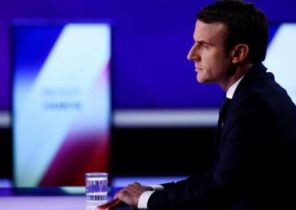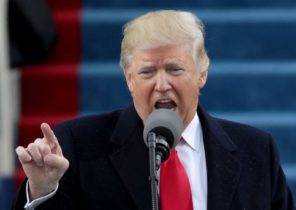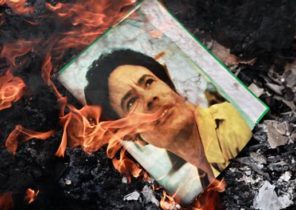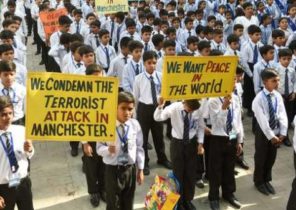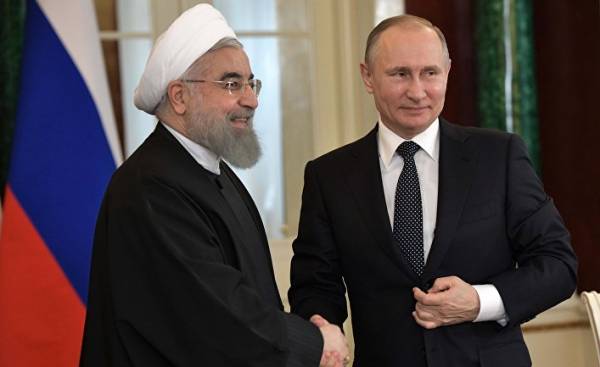
Hassan Rouhani’s first visit to Moscow after being elected President of Iran in 2013. In recent years he has repeatedly met with his Russian counterpart Vladimir Putin at international summits, but the discussions were held in bilateral format.
The two leaders took the opportunity to show themselves to be reliable allies, while some of the Syrian politicians and Russian experts say about the heightened rivalry between Moscow and Tehran on the Syrian issue.
“It’s safe to say that relations between Russia and Iran are indeed friendly, respectful nature, — Putin said at the end lasted nearly three hours of talks. — Our States are keen to strengthen the multifaceted and mutually beneficial relations, and targeted joint efforts to bring bilateral cooperation to a qualitatively new level of strategic partnership.” According to the Russian leader, Tehran is a good neighbor and reliable partner of Russia, which implies the desire to deepen partnership in various fields, especially in the economic sphere.
The two countries, whose turnover grew by more than 70% in 2016, signed a dozen agreements and protocols, including electrification of railway lines in the North of Iran and expand cooperation in the energy sector. “We are all oil producers and gas, but instead of unhealthy competition we can form constructive relations,” said Rouhani on Monday before flying to Moscow, stressing the existence of “several areas for Russian investment in Iran’s oil and gas sector”. Russia has built the Bushehr nuclear power plant in the South of the country and will be involved in the creation of nine more reactors in the coming years.
In addition, communications are cultural in nature, the expert on Iran Joker Milad (Milad Jokar) from the Institute of prospects and security in Europe. “Countries have student exchanges so that they no longer need visas for travel,” he says.
Both leaders, of course, focused on the long term and made a special emphasis on the desire to combat terrorism. In particular, they talked about Syria, where Russia and Iran conduct a military intervention against jihadist groups in support of the forces of the regime of President Bashar al-Assad. “Fortunately, our government has developed an effective cooperation to overcome the crisis and eliminate the terrorists in Syria,” said Rouhani. According to Milada Akara, meeting this need for both leaders to demonstrate unity amid drastic changes in connection with the arrival of Donald trump to power in the US (they have, as you know, there is a wide military presence in the Persian Gulf), and all those who want the departure of Bashar al-Assad. “For Tehran it is extremely important that the President is Alawite not changed hostile towards Iran’s government, as it was under Saddam Hussein in Iraq, — the expert believes. — The war with Iraq has left a deep scar in the Iranian collective memory, and the priority of the Iranian national security is the preservation of alliances in the region.”
Tripartite divisions
The allies of Damascus, Russia and Iran along with Turkey, which supports the rebels, were the organizers of the official talks between the Syrian authorities and the opposition, held in January in Kazakhstan. However, according to Syrian politicians and Russian experts, the rivalry between Moscow and Tehran becomes more apparent. Shiite Iran boasted that first entered the war in March 2011, but that Russia could change the situation in favor of the authorities of Syria after its accession to military operations on 30 September 2015. Just three weeks ago, the former press Secretary of former President of Iran Mohammad Khatami, openly criticized the Russian authorities, stating that they are not trustworthy at any time “can strike back”, caring only about their “economic interests”.
According to many Iran observers, this view is shared in the immediate vicinity of Hassan Rouhani.
Tehran and Moscow have differences regarding Turkey’s role: Russia sees victory in Syria possible thanks to a compromise with Turkey, while Tehran rejects such an approach. Relations between Turkey and Iran is difficult to call peace. The views of both countries diverge on many issues, and Syria leads the list. Ankara accuses Tehran that it wants to “send” more than 3 million Afghan refugees in Turkey, or, at least, to ease their passage through Iran to the Turkish border. The Islamic Republic is in turn accused Ankara of “interference” in its internal Affairs.
But relations with Russia Turkey is very intense. Russia provides military support to the Kurds. About ten days ago the Russian government announced the transfer of troops to the North of Syria, in the city of Afrin the Kurdish controlled resistance, which is considered by Ankara as a “terrorist organization” to monitor the ceasefire regime, acting on the territory of Syria.
In such circumstances, the meeting of Hassan Rouhani and Vladimir Putin was chosen not by chance. It took place less than two months before the presidential elections in Iran, which can lead to a change of geopolitical course of the country if it is not “a continuation of the course Rouhani,” notes Joker, speaking about the possible return of Iran to the economy of the “resistance” (i.e., economic self-determination).
